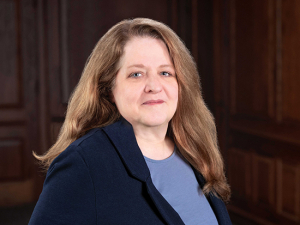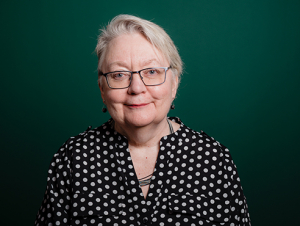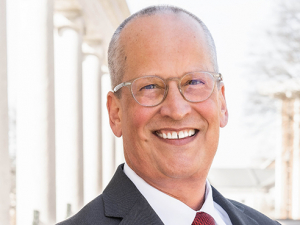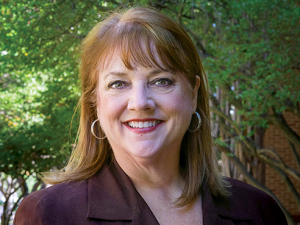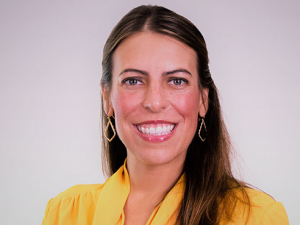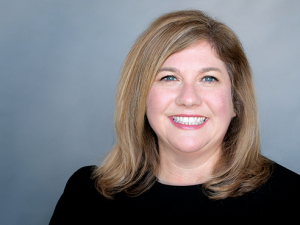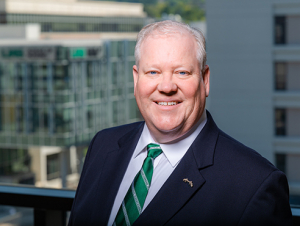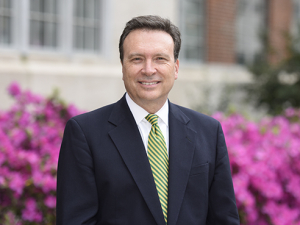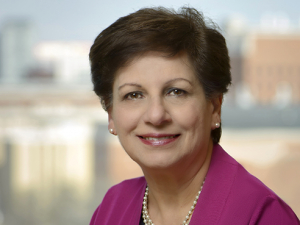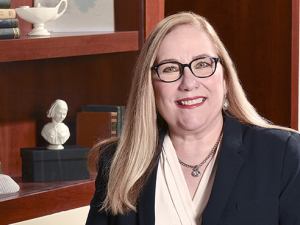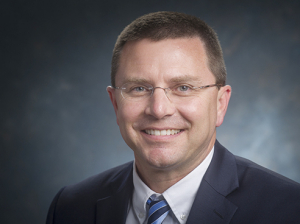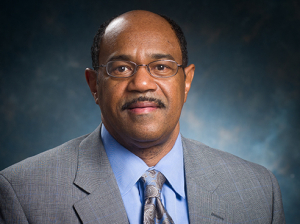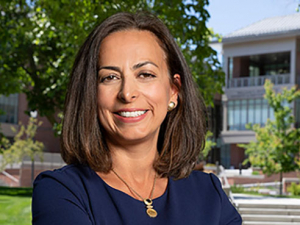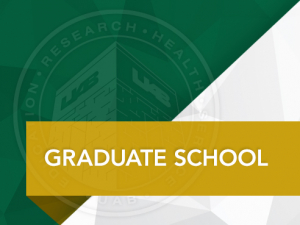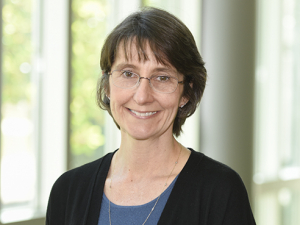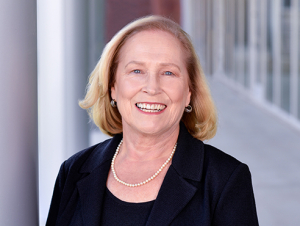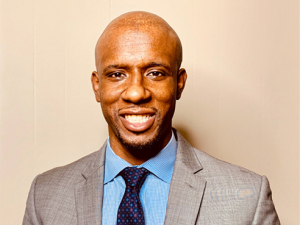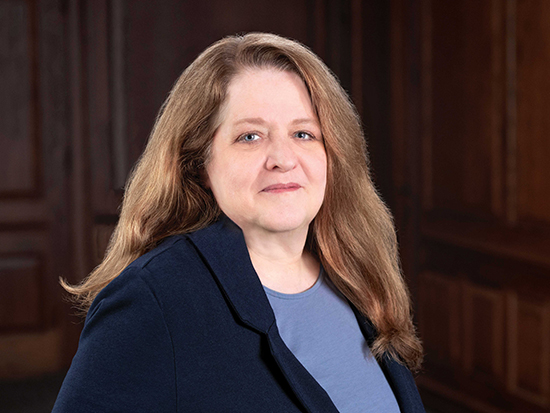 Janet Woodruff-Borden, Ph.D., who joined UAB as senior vice president of Academic Affairs and provost on Feb. 1, 2024, believes in the transformative power of higher education. She witnessed this firsthand soon after she received her own undergraduate degree in psychology in the early 1980s. Her mother, who up until then had been a stay-at-home mom, decided to go to college, and then to law school, and started her own successful law practice at age 50. “Education truly has the power to change lives,” Woodruff-Borden said.
Janet Woodruff-Borden, Ph.D., who joined UAB as senior vice president of Academic Affairs and provost on Feb. 1, 2024, believes in the transformative power of higher education. She witnessed this firsthand soon after she received her own undergraduate degree in psychology in the early 1980s. Her mother, who up until then had been a stay-at-home mom, decided to go to college, and then to law school, and started her own successful law practice at age 50. “Education truly has the power to change lives,” Woodruff-Borden said.
As a clinical psychologist, Woodruff-Borden could have chosen a career in private practice after she finished her internship and postdoc at the University of Pittsburgh in 1989, but she knew her career was in higher education — teaching, doing research and working with students. “Academia is to me the best possible world,” she said. “It is a place where new ideas, bold vision and discovery are reinforced and valued. It is the place that can have the largest impact on preparing the next generation to answer the big questions facing our world.”
For Woodruff-Borden, those questions revolved around the development of anxiety. Anxiety and depression “are the most ubiquitous mental health conditions we know and they are continuing to become even more prevalent,” Woodruff-Borden said. “It is important to examine the factors that put people at risk and those that are protective. Anxiety is very interesting because it is both a physiological and a cognitive experience,” she said. “Those systems rapidly change across development.”
“Academia is to me the best possible world. It is a place where new ideas, bold vision and discovery are reinforced and valued. It is the place that can have the largest impact on preparing the next generation to answer the big questions facing our world.”
Woodruff-Borden’s research centered on families, studying the complex interactions of genetic factors, parenting styles and experiences that can protect children from anxiety or put them at higher risk. One of her favorite of her own studies involved the brain waves of babies within 24 hours of birth “and their responses to novel stimuli — which in the case of a newborn is a different mother’s voice,” she said. “Babies are used to their own mother’s voice in utero, but not to another mother’s.” In Woodruff-Borden’s study, babies of anxious mothers oriented differently to the novelty than did those of mothers who did not have anxiety, providing an early marker for neurophysiologically based differences in attention allocation.
A systems thinker
Woodruff-Borden describes herself as a “systems thinker,” focused on the interactions among complex problems and the ways in which changes in one part of the system spread to all the others. That was what convinced her to move into administration. As the longtime director of the clinical psychology doctoral program at the University of Louisville, “the ability to help graduate students and facilitate their career development” appealed to her, “so it felt natural to move to the college level and then the dean level.”
“What does it mean to help students be successful from the moment they enroll until they go into their career? That requires all of us to do well, and that is in my mind to see things at the system level…. Being in administration gives you the chance to be the catalyst to help make that happen.”
She moved to the University of Oregon in 2018 as dean of the Graduate School and then to the Office of the Provost in 2019, where the programs she developed to prepare graduate students for different careers, support international students and create community across the school could be expanded to include undergraduates.
“What does it mean to help students be successful from the moment they enroll until they go into their career?” Woodruff-Borden said. “That requires all of us to do well, and that is in my mind to see things at the system level: enrollment management should be connected to student success, student success should be connected to alumni relations, and so on. Being in administration gives you the chance to be the catalyst to help make that happen.” In 2022, Woodruff-Borden was appointed interim provost and executive vice president at the University of Oregon. “People often asked what the job of the provost is,” she said. It is often described as the chief academic officer, “which means at the end of the day you are the person overseeing student success, faculty success and making sure that the system leads to well-educated students and faculty who can do their best work and that the university is moving forward intellectually.”
What she sees in UAB: growth with a purpose
Woodruff-Borden says she is attracted to institutions that dream big and accomplish big things. “That is how I think about our impact as universities and indeed why we exist,” she said. In her interviews and visits to campus for the provost role here, Woodruff-Borden said she immediately saw those qualities in UAB. “This is a young institution that is nimble and growing rapidly but also growing for a reason,” she said. “The Grand Challenge is a bold and exciting approach to solving complex issues. The health challenges in Alabama are well known. The problems are complex, and the approach is an audacious and innovative solution.”
“The goals are clear and big and people see themselves as contributing to them, regardless of their roles…. I marvel at how clearly that comes through and how clearly people communicate their belief in the institution and the value that it brings.”
Another thing that stood out during her interviews was the cohesiveness of the UAB community, Woodruff-Borden said. “It is so unusual to see everyone moving in the same direction. The goals are clear and big and people see themselves as contributing to them, regardless of their roles. That alignment may not be evident to people that are already here, but to someone coming in from outside, that is obvious. I marvel at how clearly that comes through and how clearly people communicate their belief in the institution and the value that it brings. That invites people who want to be innovative, to do great things and to contribute to those institutional goals.”
Soon after she started on Feb. 1, Woodruff-Borden and President Ray Watts met with the deans to discuss the results of the 2023 Engagement Survey. “For every school and college, one of the top results was that people believe in and feel a part of the mission,” she said. “Everybody talks about it and it is wonderful to be a part of a community so mission-focused.”
As she settles into her new role, Woodruff-Borden plans to get to know the campus and its people. “I will be getting to know the culture, visit units and in general be present,” she said. “My leadership style is to consult and hear from people. I want to hear the voices in the room; I listen, take input and make sure that everyone feels part of the team. Not only does their voice matter, but they are a part of moving things forward. That is what I try to achieve.”
Opportunities
Priorities for the new provost include working on responses to the enrollment and demographic changes facing all universities, with a shrinking pool of students; a focus on graduation rates and student debt; and, working with the deans, continuing to innovate and create academic programs “that are innovative and empower the next generation of students and thought leaders,” Woodruff-Borden said.
She sees particular opportunities in adding new accelerated master’s programs, developing new interdisciplinary programs and leveraging the success of the City as Classroom courses that are part of the Blazer Core Curriculum, which launched in fall 2023.
“Taking what you learn and doing it in the community is so unusual in core education. [The City as Classroom] is an exceptional opportunity for our students and for recruiting new students to UAB.”
“The benefits of a master’s degree for students who are first-generation cannot be overstated,” Woodruff-Borden said. “This is an amazing opportunity to creatively combine bachelor’s and master’s programs.” At the same time, “the big challenges facing us as a society, things like climate change and homelessness, require interdisciplinary approaches to solve,” she said. “For many complex issues, no one discipline has all the answers. We will be thinking about how to bring people together to grow these areas.” She also sees the City as Classroom courses as an outlier in higher education. “Taking what you learn and doing it in the community is so unusual in core education,” she said. “It is an exceptional opportunity for our students and for recruiting new students to UAB.”
As someone who has spent her research career focused on understanding anxiety, Woodruff-Borden also sees a role for the provost office in contributing to UAB’s strategic goals as a signatory of the Okanagan Charter and Health Promoting University. “Much of that is culture and how we think about taking care of each other,” she said. “Anxiety is a small part of that, and there are many other issues, with lots of work already happening in this space. We tend to think about students more than faculty and staff, but it is an important cultural space across the university. One of the big things about anxiety is a perception of not having control. If you believe in the purpose of what you are doing, it makes your job feel manageable. Faculty and staff who feel purpose and support for their work serve our students exceptionally well.”
Outside the office
Outside the office, Woodruff-Borden finds her creative outlets in knitting and playing the piano. She and her husband have two sons; the older is an aeronautical engineer, the younger is finishing a doctorate in theoretical physics at the Ohio State University. Woodruff-Borden’s father, a pharmacist in her native Richmond, Virginia, now lives with her.
Whenever she moves to a new city, “I have to find a yarn store,” Woodruff-Borden said — something she has already done in Birmingham. Also, “I may be a tiny bit obsessed with alpacas,” both for their incredibly soft wool, perfect for knitting, and “everything else about them,” she said.
At the University of Oregon, Woodruff-Borden formed a connection with César, the town’s “therapy llama,” whose unusually calm and patient nature made him a regular guest at the local children’s hospital, nursing homes, and on Oregon’s campus during finals. “César and I had a bond,” Woodruff-Borden said. Her colleagues made sure that he put in an appearance at her going-away party before she left for UAB. “Alpacas are smaller and more good-natured than llamas (César excepted),” Woodruff-Borden said. “Looking into the future, my retirement plan is already set — I am going to be an alpaca farmer.”
